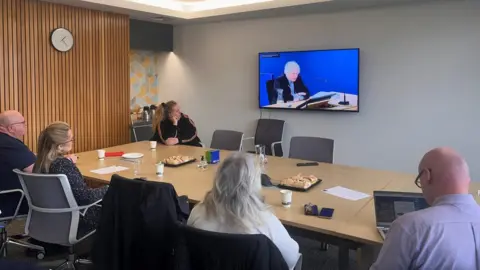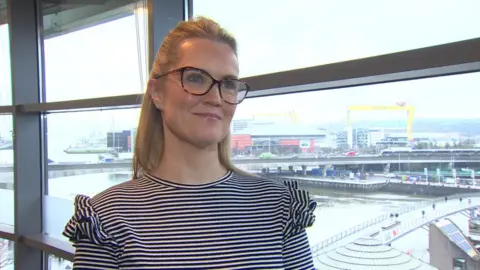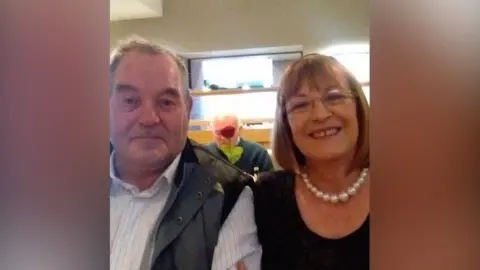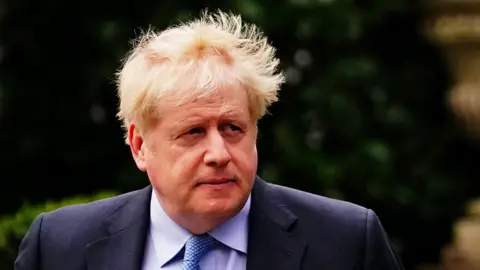Covid inquiry: NI families 'do not accept' Johnson's apology
 BBC
BBCSeveral families from Northern Ireland who lost relatives during the pandemic have rejected an apology from Boris Johnson.
The Covid-19 Bereaved Families for Justice group gathered in Belfast to watch the former prime minister's evidence to the UK Covid-19 Inquiry.
He apologised for the "pain and the loss and the suffering" caused and admitted mistakes were made.
But some of the bereaved, rejected his apology.
Brenda Doherty, the daughter of the first woman to die in Northern Ireland with Covid-19, said: "He hasn't said anything to me today to make me feel like he actually means it.
"On one level he talks about mistakes and then tries to justify them, that for me is not taking ownership."
Making reference to the Party Gate scandal, Mrs Doherty said: "They were the first obvious ones to break real lockdowns.
"When I think of the day my mummy went in to hospital on 11 March, Athletico Madrid played Liverpool, that was the week of the Cheltenham festival, so what if Mr Johnson had locked down three weeks earlier?
"Would my mum have got hospital acquired Covid?," she added.

Catriona Myles lost her 67-year-old father at the start of lockdown when he was exposed to Covid at Antrim Area Hospital.
She said: "His apology, it's worthless... actions speak louder than words.
"Mr Johnson has a casual relationship with the truth, but we know we will get to the truth in the end," she added.
'Appalling harms on either side'
On Wednesday, Mr Johnson apologised to the Covid inquiry for the way the government handled the pandemic, saying that it had "underestimated the scale and the pace of the challenge".
Giving evidence in person for the first time, the former prime minister said one mistake made during the pandemic was the difference in messaging between the UK's devolved nations.
He told the inquiry that while it was the "proper right of devolved administrations" to take their own approach at times, it made it difficult for the public to understand the messaging.
"BBC News would have one message from Number 10, then a slightly different message from Scotland or wherever - that I think we need to sort out in future," he said.
 Anne Elliott
Anne ElliottAnne Elliott's brother, Basil, died in a nursing home during Covid restrictions.
She decided that they would not accept an apology from Boris Johnson before he had addressed the Inquiry.
"Sorry doesn't cut it with me," she told BBC's Good Morning Ulster programme, upon hearing the former prime minister was expected to apologise.
"We have lost too many relatives under dreadful circumstances. My brother is three years dead tomorrow and when he was in hospital they were partying in Number 10," she added.
"The most any of us can expect and want is someone to hold our hand when we are passing from this world. I couldn't do that for my brother," she added.
She said goodbye to him on a videocall and was unable to have a proper funeral due to rules at the time.
The inquiry has seen heavy criticism of Mr Johnson by former colleagues who worked with him when Covid-19 struck.
His ex-director of communications, Lee Cain, said the pandemic was the "wrong crisis" for Mr Johnson's "skill set", describing dither and delay on key decisions.
 PA Media
PA MediaThe former chief scientific adviser, Sir Patrick Vallance, said Mr Johnson was "bamboozled" by scientific data.
And his ex-chief adviser, Dominic Cummings, repeated his past criticisms of his one-time boss, telling the inquiry that everyone called Mr Johnson "the trolley" because of his tendency to veer from one point of view to another.
But other figures at the centre of the UK's response have defended the former prime minister and his style of government.
Levelling Up Secretary Michael Gove disputed claims Mr Johnson was "incapable of making decisions" about lockdowns.
He said Mr Johnson preferred "gladiatorial decision-making" and wanted to see opposing arguments "rehearsed in front of him".
Former health secretary Matt Hancock said Mr Cummings had been attempting to grab power from Mr Johnson and created a "toxic" culture at the heart of government which undermined its pandemic response.
A spokesman for Mr Johnson said he was looking forward to assisting the inquiry with its important work.
